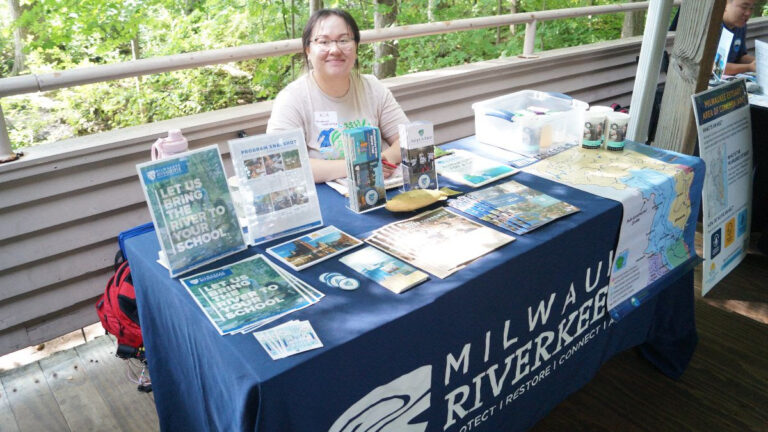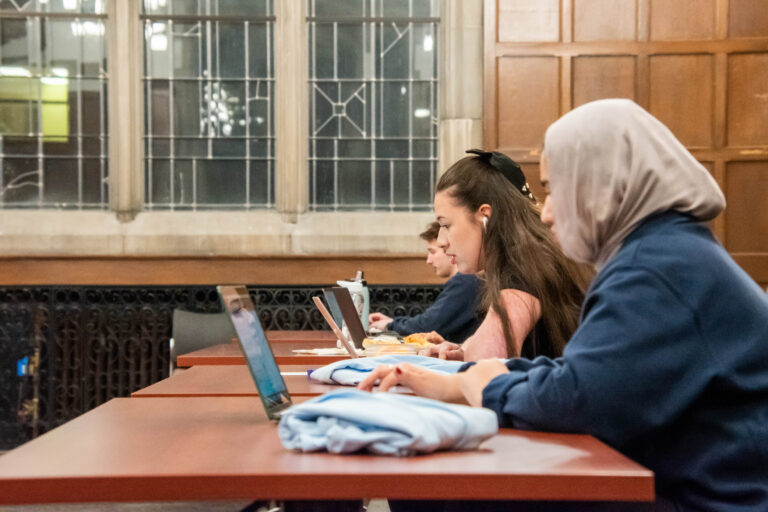Marquette Today sat down with Ashley Baird-Gaare, Comm ’07, as part of our Time to Rise series: Elevating Excellence in Women’s Athletics in honor of the 50th anniversary of Title IX. Relocating to Wisconsin from Kansas, Baird-Gaare chose Marquette and the Golden Eagles soccer team as her home.
Ranked as high at No. 12 in the nation under her leadership in 2007, she led the team to great heights. Soon after graduating, Baird-Gaare started her career in technology at SoftwareONE, here in Milwaukee. Taking her leadership skills from the field to the office, she quickly climbed the leadership ladder. Today, Ashley Baird-Gaare serves as SoftwareONE’s President for North America, and first female Extended Executive Board member for the global organization that extends to over 90 countries.
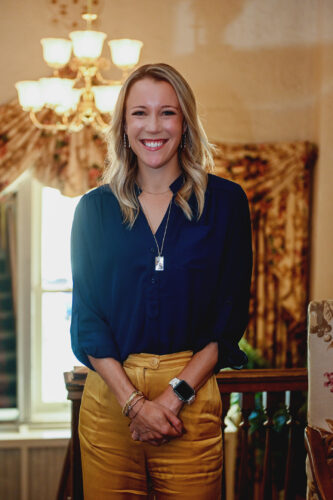
Q: You first built your business foundation right here at Marquette. What are a few enduring lessons that you learned as a student-athlete that have stood the test of time?
A: Endurance, persistence and the power of a team are lessons I learned during my time here at Marquette and still use daily in my current role. My team here at Marquette was amazing. What people saw on the surface were our successes. However, where teams bond is in the tough times.
My freshman year, I worked all season and finally earned a starting spot — just in time to tear my ACL. I was devastated and unsure of my future performance, scholarship and place on the team. However, I immediately found myself surrounded by teammates, my coach and my trainers. With their support, I overcame that traumatic event and came back to play harder and better!
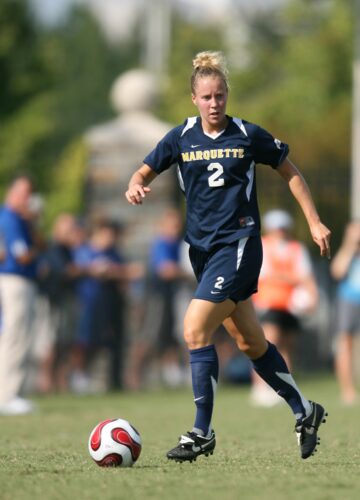
Q: You’ve described your experience as a student-athlete as being part of a family. How did your experience shape how you build a culture today as a business leader?
A: In the past, I have referenced that my time as a student-athlete was like being part of a big family, but as I reflect on that, I am afraid I did not do that word-choice justice. I now want to say that being a student-athlete is part of a community.
To me, families help develop you as you grow to adulthood and lay the foundation for future choices. I choose community because the community is built on the foundation that has already been laid. It is where we are surrounded with like-minded individuals who share an alignment with core values. My time here at Marquette as a student-athlete allowed me to develop and determine who I was as a budding young adult — and I have continued to build on that throughout the years.
I remember when Marquette and I were in conversations about me coming here. The school looked terrific, and the academic and athletic programs were impressive, but what sealed it for me was the coach. In our conversations, I felt confident that I could be my authentic-self and that he would challenge me to take my best game to new heights. Marquette chose me, and I chose them right back.
When I came to Marquette, my family taught me integrity, hard work and humility. My student-athlete community here at Marquette allowed me a community to put them into action — to strengthen and grow them so that now, as I find myself leading an international organization, I am well prepared to reinforce that culture every day.
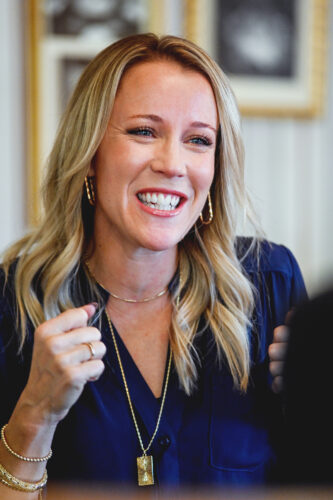
Q: Can you tell us about your career path? How did you rise so quickly in your field and what advice would you give today’s students?
A: I am, by nature, competitive and entrepreneurial. So, a job in sales in a smaller company was a natural fit for me. My company was then acquired by SoftwareONE (SWO), who (thankfully) was blazing the path for expanding all over the globe. The owner, Patrick Winter, and I aligned in our love for people, our endless curiosity to grow faster and do more! He created a culture for SWO that I also identified as my own. Because of its strong culture, SWO grew up with (and by) like-minded people. I rose quickly because of my performance and my leadership skills, and because I was surrounded by people who wanted to help me, and we helped one another. Without the support and collaboration with others, I could never have gotten to where I am.
My advice: Start by identifying your strengths as an individual. Are you outgoing? Are you competitive? Are you good with other people or do you prefer to work alone? Are you creative? Do you think big picture, work strategically and like order and process? Make a list.
Knowing who you are and how you tick is critical. Align with a position that is a match and that will create a place for you to enjoy and grow. And remember, the workforce has a learning curve. I started in sales and am now the President of North America and on the Extended Executive Board. It was a journey!
Q: Marquette’s Catholic, Jesuit tradition and emphasis on serving others drives our mission. What about this resonates with you?
A: Marquette has always had an exceptional place in my heart for many reasons, and this is one of them. This school is well known and highly respected for its selfless acts and love of others. There isn’t anything about what you said that does not appeal to me; in fact, my faith fuels my love of people and my passion for bringing others together. I also align my daily leadership focus and our core value of humility to service. Service of others and with others is essential.
Q: Talent has become a topic that has always existed but emerged as a priority recently, especially with the labor shortage. What do you look for in a candidate when you are going through an interview process? What strategies do you put in place to retain your top people?
A: Great question! There is a standard checklist of needs in the interview process, right? Correct experience and skills for the job, the candidate must meet the appropriate educational requirements… But, then there is the big ticket item for us — is this person a cultural fit? The candidate can look good on paper, but if they are not someone who aligns with our core values and will create value with others within our collaborative ecosystem, we will pass. Hiring people who are cultural matches is not only the right thing to do statistically, it bolsters their work-life harmony, their happiness at our company, their productivity and the length of time they stay with us. It is a win-win.
To retain our top people, we offer many strategies — we have a President’s Club, the Winter’s Circle, and multiple awards and recognitions we give out at our annual meeting, where I call them on stage. This year, we also have a sales trip to Cabo. All of this is on top of paying quarterly bonuses and selecting teammates to participate in additional professional and leadership growth opportunities with our Learning & Development team.
Q: You’ve talked about how student-athletes often make great sales professionals. Tell us more about why you believe this.
A: Oh, I like this question! Sales is a short-game and long-game sport that takes discipline, commitment and passion — just like a sport. A successful sales person knows to work the long-game for the big payoffs, understands that a sale cannot be rushed and that it takes time. They also know that they must meet more immediate goals so there always needs to be an awareness of what will close in the near future. That is strategy and discipline in execution.
In addition to all of that, sales is a team sport. A salesperson is an individual contributor who is part of a team and organization. That salesperson cannot know everything, but needs to have those teammates who they can reach out to and trust that they will share in the focus to get the sale across the line. For instance, a salesperson at SWO may have a client who needs more technical understanding before they are comfortable to sign on the deal. Our salespeople know they can reach out to any of their teammates in the services side or our solutions specialists who will answer their call and help them get the sale.
Lastly, when you don’t win a sale, you know how to brush yourself off and do it again until you get it right. That takes mental endurance and consistency — much like training and playing a sport.
Q: What sets SoftwareONE apart from other companies?
A: SoftwareONE is very special in many ways. Our “SWOmies” operate as a collective, we support one another and help each other. What other global company do you know of (we are in 90 countries, by the way) where any employee can reach out to the CEO or to a member of the Executive Board – and they respond? Perfect example: One of my North American employees sent an email to the CEO of our company because she was concerned about our support of our teams in the Ukraine, when Russia invaded. Dieter, the CEO of our company, who is located in Singapore, reached out to her on Teams and then called her.
We don’t just have employees; we have people who are proud to be SWOmies. They are people who matter and have full access to one another, no matter the oceans that may divide them. This creates a community in our organization and allows for great professional growth opportunities! (These are just a few ways we are set apart from other companies – I could talk for DAYS about this!)
Q. As we continue to celebrate the 50th anniversary of Title IX, what do you believe is the evolution for the future of women’s athletics?
A: I’d like to see us continue to drive for parity at all levels — whether you are playing in middle school, high school, intramurals or club. I’d also like to see peripheral roles expand. We have an excellent opportunity for more women to work in high-level careers in sports, ranging from management to sports agencies and broadcasters. There is an entire ecosystem, and women provide significant value within this space.
